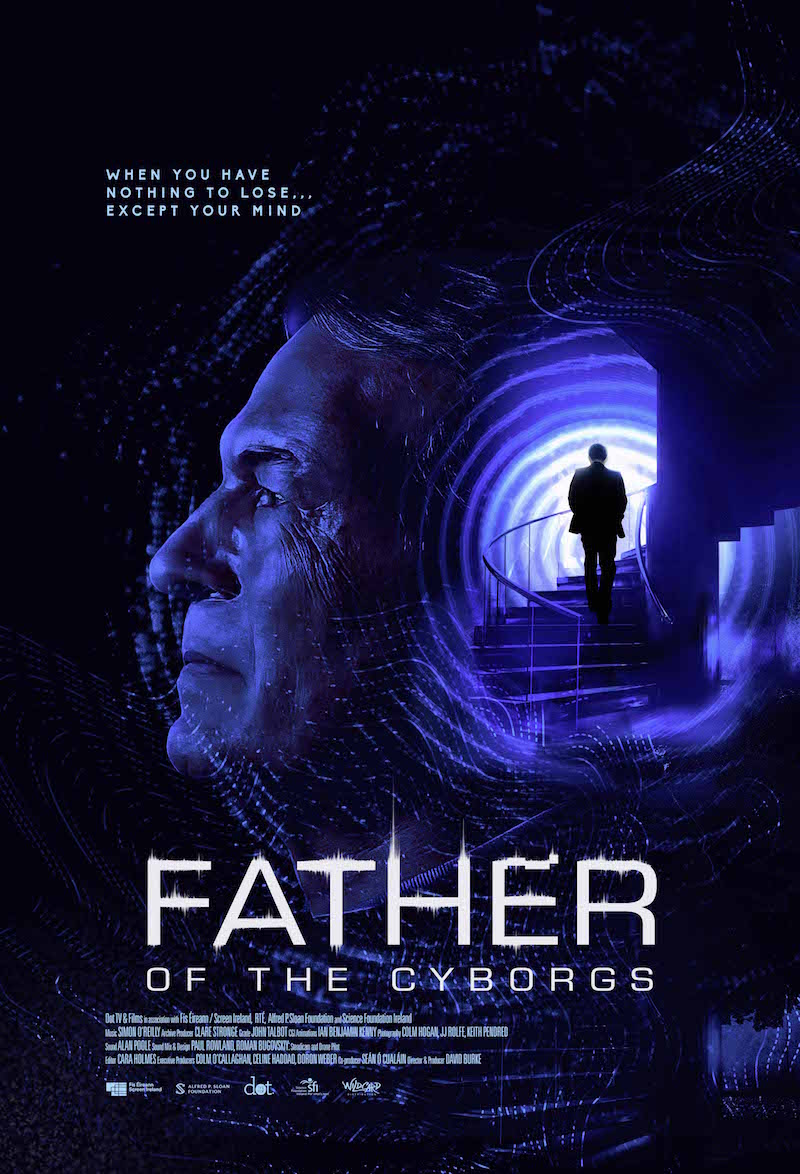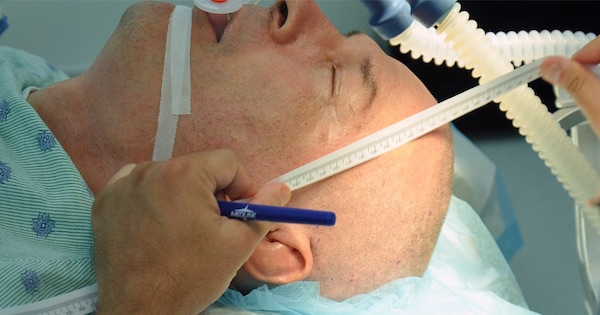
FILM REVIEW BY CHARLES BATTERSBY | After a quick glance at the title and synopsis of Father of the Cyborgs, audiences could be forgiven for thinking it’s a science fiction movie about the origin of a supervillain. Imagine a brilliant scientist who is also a humanitarian who has dedicated his life to cutting edge research. He condemns “science by committee” and, unable to secure funding for his next experiment in cybernetics, uses himself as the test subject in a groundbreaking effort to connect the human mind to a computer. Despite the outlandish story, it is actually a documentary about the real life of Dr. Phil Kennedy.
The premise of Kennedy’s work is so futuristic that award-winning Irish documentary filmmaker David Burke (making his directorial debut here) devotes much of the movie’s 76-minute run time to archival footage of 20th century scientists wiring devices into the heads of animals. This is done to ease audiences into accepting that the rest of what they are about to see is real. Old footage of bulls, monkeys, and rats being turned into cybernetic puppets shows that the comic book premise is rooted in research from decades ago. Aside from the animal experiments, the filmmakers also use footage of humans getting lobotomies and electroshock therapy. Modern doctors like Rajesh Rao are shown speculating on the ethical concerns of these procedures with the question, “Who gets the brain implant and who gets the controller?”
These early pioneers are not the central subjects of the film. Rather, it is about the work of Dr. Phil Kennedy. Unlike his predecessors, who were trying to control people through brain implants, Kennedy wanted to help his patients control computers with their brains.
He worked with people suffering from “Locked-in Syndrome,” a condition in which a person is fully aware of the world around them, but can neither move nor speak. Kennedy devised a glass and wire electrode that could be implanted in a human brain and allowed these people to exert rudimentary control over a computer. Eventually, Kennedy attempted to convert a patient’s thoughts into computer-simulated speech.
The film covers Kennedy’s work with several people in the 90s and early 2000s. This includes older footage from when his work caused a stir in the news. There are also modern interviews with the families of his former patients, along with Kennedy looking back on those times. The most dramatic part of Kennedy’s story comes later in his career, however, and the movie takes its time getting to this.
By the 2010’s Kennedy’s form of surgery became unfashionable or less pragmatic than other ways to treat locked-in syndrome. With his funding cut, and nowhere else to turn, he took the drastic act of traveling to Central America where he used the “Medical Tourism” industry to have his experimental devices implanted in his own brain. It is quite engrossing to see interviews with the flamboyant people who arranged and performed this ethically questionable surgery. They vividly recount the post-op complications of the procedure, but the filmmakers make the audience wait to find out what happened in the long run.
Because there are several interviews with Kennedy earlier in the film, it isn’t a spoiler to say that he survived, more or less intact. The movie also includes gruesome video of the operation being performed, accompanied by surreal commentary from Kennedy as he observes, with an expert eye, how his own brain was being augmented.
Elsewhere in the movie, he is shown mourning at the graves of his former patients, grieving with their families, and even delivering a eulogy at a funeral for one of his more recent cyborgs. Kennedy’s life and work have been covered before in the media, but this film goes a step further and tries to humanize the cyborgs.
Father of the Cyborgs had its world premiere on June 17, 2021, at the Tribeca Film Festival (click here for more info). After the screening, the Alfred P. Sloan Foundation hosted a panel discussion moderated by Jen Schwartz (Scientific American), and featuring subject and neurologist Dr. Phil Kennedy, director of the Georgia Tech BrainLab. He was joined by Dr. Melody Moore Jackson and neurobiologist Dr. Darcy B. Kelley, who also appear in the film.
Runtime: 76 minutes. Directed by David Burke, who also wrote the screenplay and co-produced. Cinematography by Colm Hogan, JJ Rolfe, and Keith Pendred. Edited by Cara Holmes. To view the trailer and learn about upcoming screening opportunities, click here.
Chelsea Community News is made possible with the help of our awesome advertisers, and the support of our readers. If you like what you see, please consider taking part in our GoFundMe campaign (click here). To make a direct donation, give feedback, or send a Letter to the Editor, email scott@chelseacommunitynews.com.


You must be logged in to post a comment Login